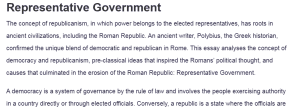Representative Government
The concept of republicanism, in which power belongs to the elected representatives, has roots in ancient civilizations, including the Roman Republic. An ancient writer, Polybius, the Greek historian, confirmed the unique blend of democratic and republican in Rome. This essay analyses the concept of democracy and republicanism, pre-classical ideas that inspired the Romans’ political thought, and causes that culminated in the erosion of the Roman Republic: Representative Government.
A democracy is a system of governance by the rule of law and involves the people exercising authority in a country directly or through elected officials. Conversely, a republic is a state where the officials are selected or elected by the people concerning the state’s laws and usually is surrounded by a constitution. Polybius postulated that Rome was partly democratic since it comprised the monarchy (the consuls) and aristocracy (the senate) but, more importantly, the power of the masses in the election of political officers and in passing legislation.[1] He also pointed out that the people of Rome were involved in many decision-making processes, including whether to go to war to make peace, among other related decisions.
Therefore, Rome was able to sustain this measure of well-being and balance of power that can be regarded as the democratic element of the republics. I concur with him on this account because the Romans substantially involved the citizens in the decision-making process while having a fair number of representatives within the republican setting, acting as a proto-democracy grouping power.
Binetti identified the Ancient Greeks, specifically Athens, as responsible for nurturing the early thoughts of republicanism and representative governance, as well as the Phoenicians. Greeks brought in democracy, such as the popular assembly of Athens, where the free male individuals would come together to make decisions by consensus, however crude, asserting minor principles of direct rule. On the other hand, the Phoenicians, with their city-state of Carthage, provided combined elements of a rather aristocratic yet with some popular input in the form of councils and assemblies.[2] These civilizations provided a framework for Rome by showing models of power division rather than concentrating on the power of one ruler, providing ways of balancing different social interests within the government.
Despite its innovative system, the Roman Republic’s downfall stemmed from long-term and immediate challenges. Long-term effect which include enhancing the measures of the economic difference and the suffering of voter less democracy inconstant brought about civil disobedience and the senate mistrust. In addition, the relationship between corruption and power abuse is closely connected to the city’s political contexts.[3] Short-term crises were, for example, the military leader Julius Caesar, who, through his popular backing and militia, could eliminate some of the conventional republican balances to power leading to civil wars.
Lastly, the failure of the Republic to grow as a central power needed for a massive and complex empire allowed the emergence of a centralized power, dictatorship. This political change indicated the problems of Rome’s political structures, whether internally pressured or externally. This destruction of the Republic is perhaps the best example of portraying how sociopolitical domination and social divide can both destroy an efficiently constructed framework of government.
In conclusion, the Roman Republic was a groundbreaking model of democracy and representative government combined. However, political and other forces, including military coups and social revolution, led to degeneration into an absolutistic model. This process shows the weaknesses and frailties of republican systems given evolving political and social processes.
From Julius Caesar’s ability to assemble armies that were loyal to him, the checks and balances meant to counter the appeal of such authority were defeated. Last, the power modality shift from a republic to an empire reveals the intricate practice of maintaining a system of Representative Democracy over the long run.
Bibliography
Binetti, Christopher. “Sprouts of the Ancients: The Ancient Roots of Representation in the Greater Mediterranean Region from the Hittites to Rome.” Geopolitics, History, and International Relations 9, no. 2 (2017): 174–98. https://www.ceeol.com/search/article-detail?id=580209.
Polybius. “The Histories of Polybius.” Vol. III of the Loeb Classical Library edition, 1923. https://penelope.uchicago.edu/Thayer/E/Roman/Texts/Polybius/6*.html.
[1] Polybius, “The Histories of Polybius” (Vol. III of the Loeb Classical Library edition, 1923), https://penelope.uchicago.edu/Thayer/E/Roman/Texts/Polybius/6*.html.
[2] Christopher Binetti, “Sprouts of the Ancients: The Ancient Roots of Representation in the Greater Mediterranean Region from the Hittites to Rome,” Geopolitics, History, and International Relations 9, no. 2 (2017): 174–98, https://www.ceeol.com/search/article-detail?id=580209.
[3] Polybius, “The Histories of Polybius” (Vol. III of the Loeb Classical Library edition, 1923), https://penelope.uchicago.edu/Thayer/E/Roman/Texts/Polybius/6*.html.
ORDER A PLAGIARISM-FREE PAPER HERE
We’ll write everything from scratch
Question
This week, you were assigned two readings that relate to the form of government known as a “republic,” an ancient writing by the Greek historian, Polybius, and an article by a modern historian, Christopher Binetti. For this week’s essay, I want you answer the following questions using evidence from the readings, textbook, and/or lectures:
First, what is a democracy and what is a republic? Why did Polybius say that Ancient Rome was partially ‘democratic’ and do you agree with him?
Second, according to Binetti, which ancient civilizations (before the Romans) were most important in introducing ideas of republicanism and representative government?

Representative Government
Third, if the Roman Republican system was so ingenious, why did it devolve into a system more like a dictatorship or monarchy? What long and short term threats brought down the Republic?
You must use the Chicago Citation style when citing, quoting, or paraphrasing Polybius, Binetti, or the textbook. Please let me know if you have any questions.
Resources:

